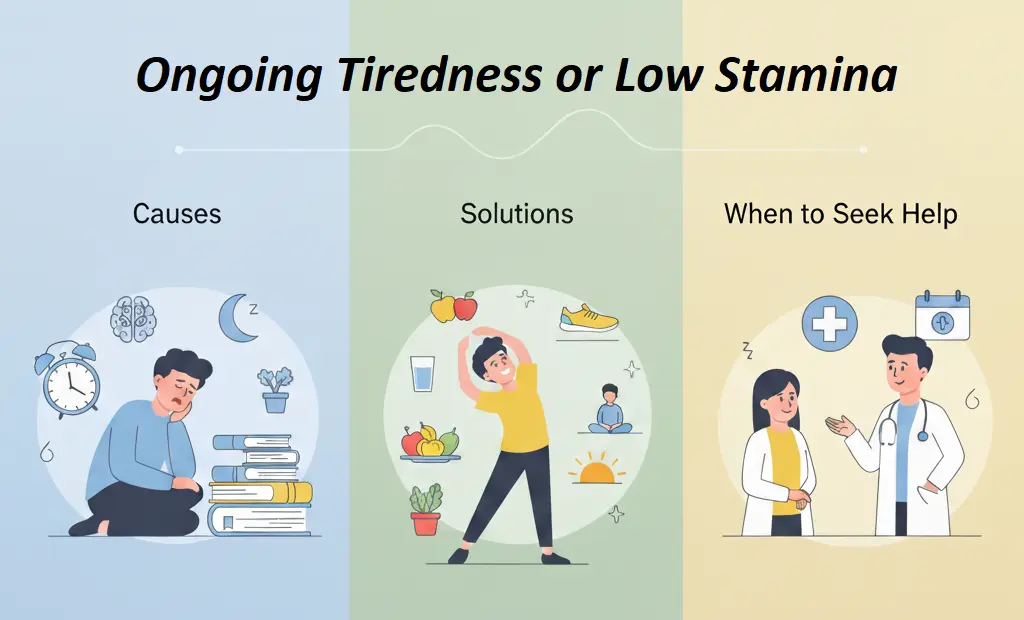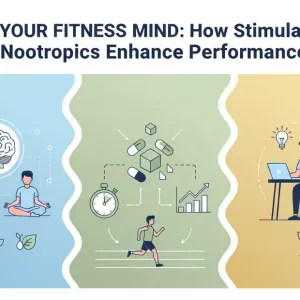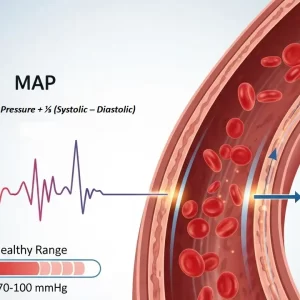Contents
Everyone feels tired now and then, whether it’s from a late night, a tough workout, or a busy week at work. But when tiredness becomes a daily struggle and low stamina keeps you from performing well in your workouts or everyday tasks, it’s worth paying attention. Persistent fatigue is not a normal state—it’s often a signal from your body that something deeper needs addressing.
This guide helps you pinpoint the cause of your ongoing tiredness or low stamina. Learn about effective solutions and understand when it’s time to seek medical advice.
Lifestyle Factors That Drain Energy
Before jumping to medical explanations, it’s important to look at daily habits. Often, tiredness stems from simple—but significant—choices.
1. Poor Sleep Quality
- Adults need 7–9 hours of quality sleep per night. Even if you’re in bed that long, fragmented or shallow sleep reduces recovery.
- Causes may include late-night screen time, inconsistent schedules, caffeine, or sleep apnea.
2. Nutrition and Energy Levels
- Undereating or nutrient deficiencies (especially iron, vitamin D, and B12) can cause fatigue.
- Diets low in complex carbohydrates reduce glycogen stores, leading to low stamina in workouts.
- High sugar intake causes energy spikes followed by sharp crashes.
3. Sedentary Lifestyle
- Paradoxically, inactivity makes you feel more tired. Regular physical activity improves cardiovascular health, circulation, and mitochondrial efficiency—key factors in energy production.
4. Stress and Mental Fatigue
- Chronic stress elevates cortisol, which disrupts sleep, appetite, and energy regulation.
- Mental exhaustion from overwork or constant multitasking can feel as draining as physical fatigue.
Exercise and Low Stamina
Sometimes fatigue shows up most clearly during workouts. You may notice:
- Difficulty maintaining intensity
- Heavier-than-usual weights
- Shortness of breath earlier in cardio sessions
Possible Causes
- Overtraining: Too much exercise without recovery raises the risk of hormonal imbalances, muscle fatigue, and suppressed immune function.
- Lack of Periodization: Training the same way every day without deloads or variation can drain energy over time.
- Poor Fueling: Skipping pre-workout meals or under-hydrating decreases performance capacity.
Fix: Balance training with rest, hydrate adequately, and prioritize carbohydrate and protein intake around workouts to replenish glycogen and support recovery.
Medical Causes of Ongoing Tiredness
If lifestyle changes don’t improve stamina, underlying medical conditions could be at play.
- Anemia: Low red blood cell count or iron deficiency reduces oxygen delivery to muscles and tissues.
- Thyroid Disorders: Both hypothyroidism and hyperthyroidism can cause fatigue.
- Diabetes: Blood sugar fluctuations impact energy levels.
- Sleep Disorders: Sleep apnea, restless leg syndrome, and insomnia significantly reduce recovery.
- Chronic Fatigue Syndrome (CFS/ME): A complex condition marked by extreme fatigue not relieved by rest.
- Heart or Lung Issues: Cardiovascular and respiratory conditions reduce stamina due to poor oxygen utilization.
Practical Strategies to Boost Energy and Stamina
While it’s important to rule out medical conditions, many people benefit from evidence-based lifestyle adjustments.
1. Sleep Hygiene
- Maintain a consistent sleep schedule.
- Limit screens and bright lights 1–2 hours before bed.
- Keep your bedroom cool, quiet, and dark.
2. Balanced Nutrition
- Include iron-rich foods (lean meats, beans, spinach).
- Prioritize complex carbs for steady energy.
- Stay hydrated—aim for 2–3 liters of water daily, more if training heavily.
3. Smarter Training
- Incorporate rest days and deload weeks.
- Use progressive overload rather than constant maximal effort.
- Balance strength and cardio for total stamina development.
4. Stress Management
- Try relaxation techniques like deep breathing, meditation, or yoga.
- Spend time outdoors and disconnect from screens periodically.
When to Seek Professional Help
If your fatigue persists for weeks despite lifestyle adjustments, consult a healthcare professional. Seek medical advice if you experience:
- Extreme tiredness that disrupts daily life
- Shortness of breath, chest pain, or dizziness with mild activity
- Unexplained weight loss or gain
- Persistent muscle weakness
- Mood changes like depression or anxiety
Conclusion
Ongoing tiredness and low stamina aren’t issues to ignore. While lifestyle factors like sleep, nutrition, and stress are the most common culprits, medical conditions can also play a role. By paying attention to your daily habits, structuring your workouts wisely, and knowing when to seek medical advice, you can move closer to restoring your energy and performance.
References
- Grandner, M. A. (2017). Sleep, health, and society. Sleep Medicine Clinics, 12(1), 1–22. https://doi.org/10.1016/j.jsmc.2016.10.012
- Pedersen, B. K., & Saltin, B. (2015). Exercise as medicine—evidence for prescribing exercise as therapy in 26 different chronic diseases. Scandinavian Journal of Medicine & Science in Sports, 25, 1–72. https://doi.org/10.1111/sms.12581
- Bianchi, M. T., & Thomas, R. J. (2013). Sleep apnea: Impact on cognition and cardiovascular risk. Chest, 143(2), 566–575.
- Horne, J. (2016). Exercise benefits for the chronically fatigued. Clinical Medicine, 16(6), 557–560.



